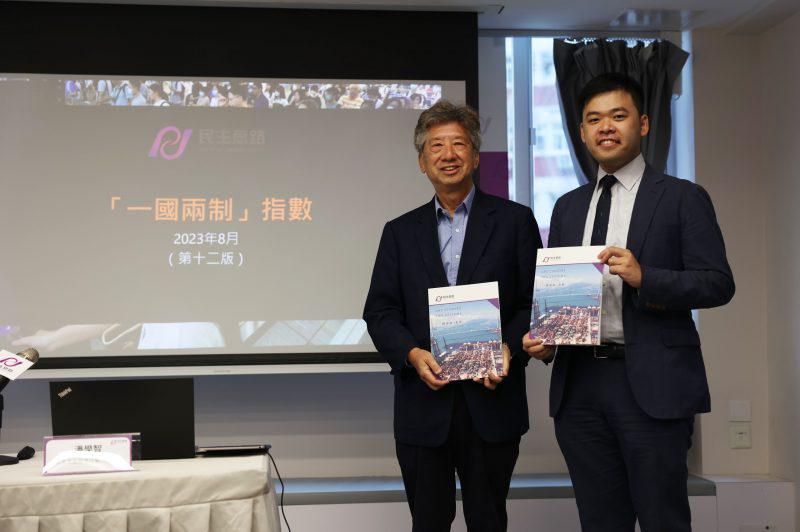【Press Release】

Path of Democracy’s “One Country, Two Systems” Index Rises to 6.02 points, Maintaining an Upward Trend
(Press Release) Path of Democracy is releasing the latest “One Country, Two Systems” (hereinafter refer to as “1C2S”) Index today, and the Index rises by 1.7% from 5.92 in July 2023 to 6.02. The index is an objective evaluation of the current 1C2S, and is a composite value of 6 pillars and 24 sub-pillars from public opinion surveys and international evaluations.
Evaluation of 1C2S by Local and International Communities
Scores of the three pillars in the public opinion including “Hong Kong-Mainland relations” (+5.4%), followed by “high degree of autonomy” (+5.0%) and “human rights and freedom” (3.4%) are all in the rising trend. Among all its twelve sub-pillar whose scores all rises across the board, the top three with largest increase in proportion were “resolving via dialogue and negotiation” (+12%), “full implementation of 1C2S in the future” (8.1%), and “self-conduct of administrative affairs” (+8.1%).
Project leader Ray Poon points out that border reopening symbolizes the reconnection with mainland China. Close cross-boundary socioeconomic ties disrupted by anti-pandemic measures are gradually reforging. Citizens share a strong sense of getting back on track.
Hong Kong’s performance in “democratic development” becomes worse and it falls by -1.6%, which is the greatest fall among three pillars for international perception. Its global ranking remains as 91. “Civil rights” continues to drop (-0.8%) and its global ranking falls slightly from 72 to 73. “Economic openness” (-0.3%) inevitably lags behind the general trend, but its global ranking remains second. Most of the twelve sub-pillars decline in score, with the three biggest declining proportions being “political pluralism” (-8.0%), “individual rights” (-2.5%) and “expression, association and assembly” (-1.2%).
Citizens’ Perceptions to National Security Law Improved
Citizens remain divided over the impact of the implementation of National Security Law (“NSL”) on 1C2S as NSL has been implemented for three years. Compared to the second half of 2022, those believing it have a positive impact increased by 6.7 percentage points to 31.4%, while those thinking it has a negative impact decreased by 1.7 percentage points to 38.3%. The gap between two groups is narrowing. 15.3% of respondents believe that there is no impact.
Strengthening Dual Identity Recognition
When compared to January 2023, citizens’ ratings of being “Chinese” increase sharply from 6.19 to 6.78 by 9.5%; ratings of being “Hongkongers” rose from 7.24 to 7.79 by 7.6%. The proportion of having “dual identity” rises from 47.5% to 59.4% by 11.9 percentage points, but it is still the mainstream identity.
Public’s Unfamiliarity with National Constitution
Survey results shows that nearly half (47.6%) of respondents state they are unfamiliar of the national constitution, 15.5% claim to know half-half, and only less than one-third (28.9%) consider themselves familiar with it. Hong Kong citizens’ average score is just 4.15 out of 10 as the maximum score.
Negative Impact Brought by Legislation on Crowd-Funding Activities
As to the perceived impact of a potential legislation against crowd-funding activities to business environment, more respondents (29.9%) believe that it will bring a negative impact than a positive impact (17.6%). 24.1% of respondents deem that there would be no impact.
Ronny Tong, Convenor of Path of Democracy, believes that Hong Kong has been promoting the national constitution for many years, but less than a third of respondents in the poll are familiar with it. He asserts that understanding the national constitution leads to comprehending the constitutional order of the nation and Hong Kong Special Administrative Region (HKSAR), the fundamental governance system of the country, and the legal source of power for HKSAR government. The results of the newly added question on the awareness of the national constitution affirm that most Hong Kong people still lack understanding of the national situation. Is this due to a lack of education or publicity, or is it a result of some people’s stubborn resistance to Chinese and the Hong Kong government? Path of Democracy will continue to explore this paradoxical issue.
For Full Report, please visit: http://pathofdemocracy.hk/1c2s-index/

 EN
EN Login
Login Donation
Donation

 Back
Back